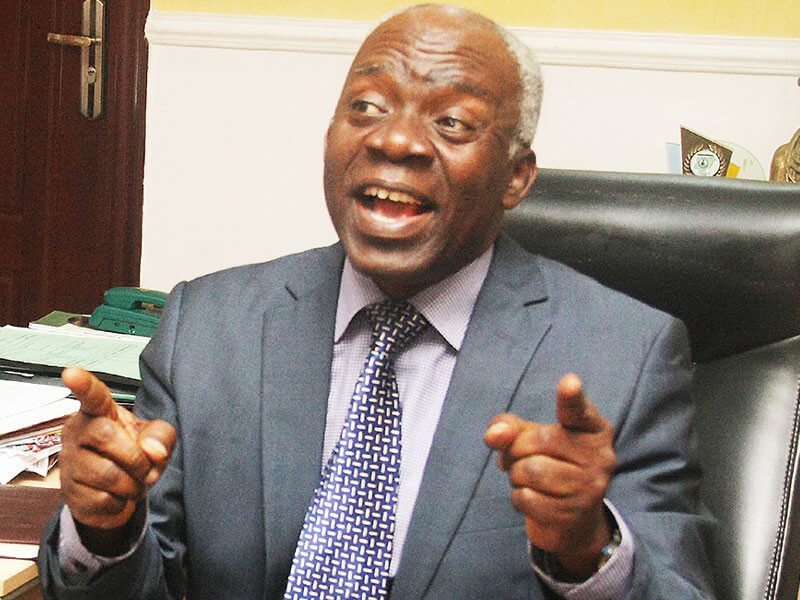Unlike the Peoples Democratic Party (PDP) that boasted to rule Nigeria for 60 years, Nigeria’s foremost human rights lawyer, Mr. Femi Falana (SAN) yesterday disclosed that the All Progressives Congress (APC) had perfected plans to rule the country indefinitely.
Falana, a former President of the West African Bar Association (WABA), also said the Electoral Amendment Bill might not be signed into law citing the failure of the National Assembly to complete the process of its enactment and transmit it to President Muhammadu Buhari for assent.

He expressed these grave concerns during an exclusive interview with Newsmen yesterday, pointing out how the Buhari administration reneged on different promises made to Nigerians during presidential campaigns in 2014.
Falana, who spoke on diverse issues of national concerns during the interview, said: “Unlike the PDP, which boasted that it would rule Nigeria for 60 years, the APC has perfected plans to rule Nigeria indefinitely.
“Hence, the new Electoral Amendment Bill is not likely to be signed into law. Very soon, Nigerians will be told that the bill cannot be signed by the president since the 2023 elections are around the corner,” he observed.
Reflecting on Buhari’s breach of campaign promises, Falana explained how the APC had campaigned to reform the electoral process by implementing the recommendations of the Justice Muhammed Uwais Electoral Reform Panel before the 2015 elections
Upon assumption of power, however, the human rights lawyer noted with grave concern that the ruling party reneged on its pact with the people on electoral reform.
Before the Ekiti State governorship election in 2014, he explained how some APC leaders obtained court orders, which restrained the Jonathan administration from deploying the armed forces in the management of elections.
He, however, said: “The APC government deploys armed military and police personnel in the manipulations of elections including local government elections. As if that is not enough, voters are induced with money, rice, beans and salt in utter contravention to the Electoral Act.”
On these grounds, the senior advocate claimed that the Buhari administration had failed to reform the country’s dysfunctional electoral system after six years in the saddle, hence contravening its campaign promise.
Before the 2015 elections, the APC entrenched restructuring in its manifesto and campaigned for power devolution from the centre to the other federating units, one of the reasons it garnered popular support nationwide.
Apart from its promise to devolve powers to the federating units, the APC also campaigned to reform the country’s electoral system in line with the recommendation of the Justice Muhammed Uwais Electoral Reform Panel.
On December 7, 2018, Buhari rejected the Electoral Amendment Bill that could have transformed the country’s electoral system positively on the ground that it could affect the 2019 elections contrary to these promises.
In the same way, the president had not taken any concrete step to implement the report of the APC Committee on True Federalism; the outcome had fuelled agitations either for return to regional government or outright separation from Nigeria in different parts of the country.
Despite Buhari’s lukewarm approach to comprehensive electoral reforms, Falana challenged the National Assembly to fast-track the process of amending the Electoral Amendment Bill ahead of the 2023 general election.
He recommended the need to legalise the use of card readers and electronic voting and collation of results and direct transmission to INEC central server.
He urged the National Assembly to prioritise the review of the Electoral Amendment Bill since the president did not sign the bill into law in 2018 on the ground that it was too close to the last general election.
The human rights lawyers observed that the new bill “has not been passed and forwarded to the president for his assent for reasons best known to both chambers of the National Assembly.
“The delay is affecting the preparations of INEC for the 2023 general election. It is high time sufficient pressure was mounted on the federal legislators to pass the Electoral Amendment Bill as a further delay will adversely affect the conduct and management of future elections in the country.
“But it is doubtful if the country can hold a peaceful general election in 2023. In 2015, the Jonathan administration postponed the general election for six weeks because some local governments in Borno State were under the control of terrorists.
“Today, a number of state governments and hundreds of local governments are under either total or partial control of insurgents, bandits and other gunmen. It is hoped that the federal government will not invoke and apply Section 135 of the 1999 Constitution,” he observed
He noted that the section empowered the president “to postpone elections if he considers that it is not practicable to hold elections on the ground that the country is involved in a war in which its territory is physically involved.
“This is why all hands should be on deck to enact a new electoral law, which should provide for electronic voting. That is the only way to ensure that elections are conducted in many parts of the country at any given time.”